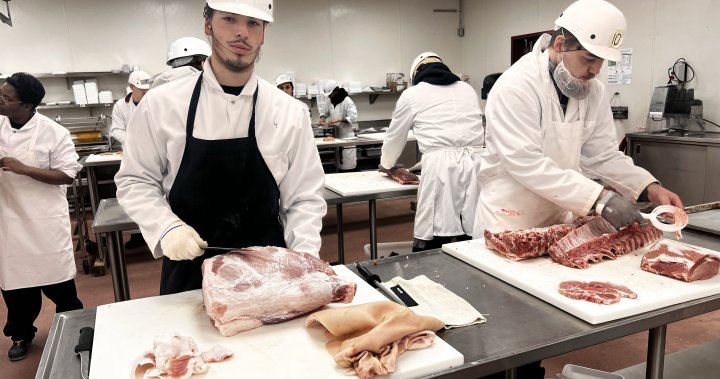A Looming Shortage: The Decline of Butchery in Quebec
The province of Quebec is grappling with a significant shortage of butchers, a trend mirroring a broader national crisis in the meat processing industry. An aging workforce, coupled with a lack of interest from younger generations, has created a vacuum in this essential trade. The Lester B. Pearson School Board, the sole provider of an English-language retail butchery program in Quebec, is striving to address this looming deficit through its comprehensive training program at the PACC Career Centre in Montreal. However, despite the readily available job opportunities and the potential for lucrative careers, enrollment remains low, raising concerns about the future of meat retail in the province. Projections indicate that nearly 40% of Quebec’s butchers will retire within the next decade, exacerbating the existing shortage if a new generation of skilled professionals isn’t cultivated.
Hands-On Learning and the Appeal of a Traditional Trade
The PACC Career Centre’s eight-month retail butchery program emphasizes hands-on learning, providing students with practical experience in the art of meat cutting and preparation. This focus on tangible skills attracts individuals like Josh Morin-Surette, a student who values the opportunity to work with his hands and envisions a future owning a farm-to-table business. For Morin-Surette and others, the program represents a crucial step towards achieving their career aspirations. The program’s emphasis on practical skills distinguishes it from the increasingly popular desk-based office jobs, offering a tangible and rewarding career path for those seeking an alternative to traditional office work. This hands-on approach also allows students to immediately apply their learned skills in real-world settings.
The Ripple Effects of a Butcher Shortage
The dwindling number of butchers poses significant implications for the food industry and consumers alike. Fewer butchers could lead to a decline in meat stalls at local markets, reduced services at grocery stores, and ultimately, limited access to quality meat products for consumers. The Canadian Meat Council has recognized this labor shortage as a crisis, estimating close to 10,000 vacant butcher positions across the country. This shortage not only impacts consumer access to meat but also threatens the economic viability of the meat processing industry and related businesses. The ripple effects extend beyond just the availability of meat, potentially affecting local economies and food systems.
Financial Incentives and the Struggle to Attract New Talent
In an effort to combat this shortage, the Quebec government has implemented financial incentives, including subsidizing tuition for students pursuing careers in fields with labor shortages. The Lester B. Pearson School Board also provides funding for out-of-province and international students who need to relocate to participate in the butchery program. These initiatives underscore the urgency of addressing the butcher shortage and the lengths to which authorities are willing to go to attract new talent. Despite these efforts, the perception of butchery as a "dying trade" persists, hindering recruitment efforts and perpetuating the cycle of decline.
Beyond the Carcass: The Holistic Approach to Butchery Education
The PACC Career Centre’s program goes beyond simply teaching the technical skills of butchering. It emphasizes customer service, relationship building, and the importance of understanding the entire process from carcass to consumer. Students are trained to not only expertly handle meat but also to interact with customers, understand their needs, and provide personalized service. This holistic approach prepares graduates for a multifaceted career that extends beyond the technical aspects of the trade. It equips them with the skills to succeed in various roles within the food industry, from butcher shops to high-end restaurants.
A Promising Career Path: High Demand and Earning Potential
The high demand for butchers translates into significant career opportunities and earning potential for graduates. While starting wages may be at minimum wage, experienced butchers can earn up to $30 per hour, making it a potentially lucrative career path. The ability to work full-time consistently and the growing demand for specialized skills create a favorable job market for aspiring butchers. Combined with the prospect of career advancement and entrepreneurship opportunities, such as opening a butcher shop or farm-to-table business, the trade offers a promising future for those willing to embrace the craft. Furthermore, experienced butchers are highly sought after by upscale restaurants and specialty food stores, further enhancing their career prospects.

